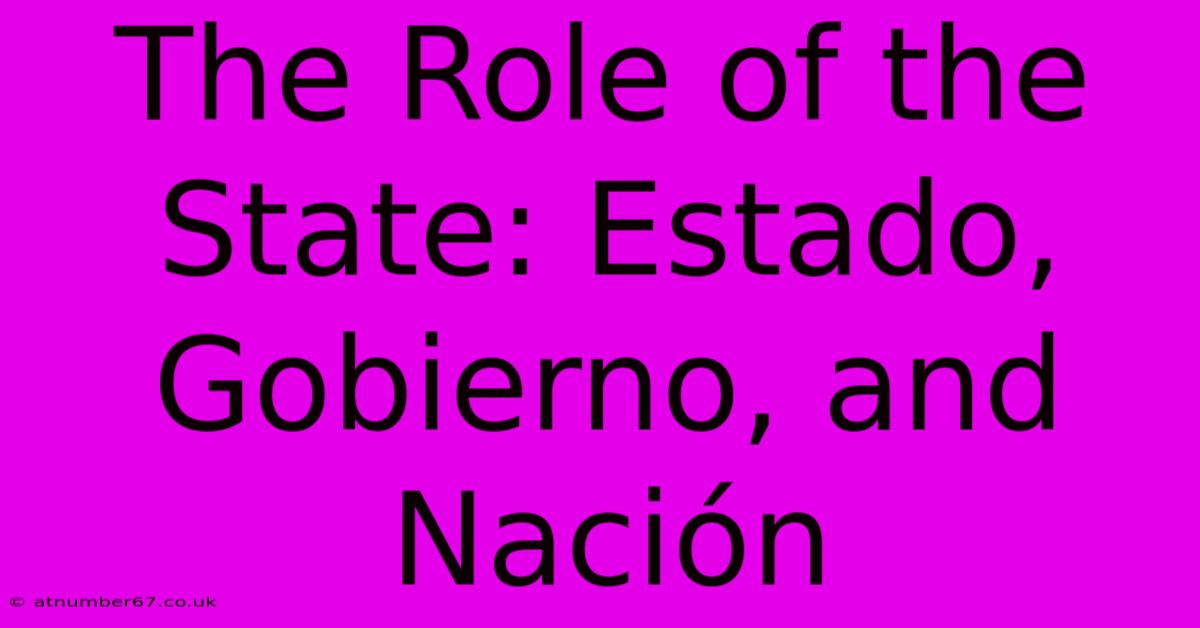The Role Of The State: Estado, Gobierno, And Nación

Table of Contents
The Role of the State: Understanding Estado, Gobierno, and Nación
The terms Estado, Gobierno, and Nación are often used interchangeably, leading to confusion about their distinct roles and functions within a political system. While interconnected, they represent different, yet crucial, aspects of a state’s structure and its relationship with its people. This article will clarify the distinctions between these three key concepts, exploring their individual roles and their intricate interplay.
Understanding the Estado (State)
The Estado, in its broadest sense, refers to the political entity itself. It's the permanent structure possessing sovereignty, encompassing its territory, population, and government. Think of it as the overarching framework, the legal and institutional foundation upon which the entire political system is built. Key characteristics of the Estado include:
- Sovereignty: The supreme authority within its territory, free from external control.
- Territory: A defined geographical area under its jurisdiction.
- Population: The citizens residing within its territory.
- Legitimacy: The acceptance of its authority by the population.
The Estado is responsible for establishing the legal framework, defining citizenship rights, ensuring national security, and providing essential public services like education and healthcare. It endures beyond changes in government.
Defining the Gobierno (Government)
The Gobierno refers to the organ of the Estado responsible for exercising political power. It is the temporary administration that implements the laws and policies of the Estado. The Gobierno is composed of the executive, legislative, and judicial branches, each with its own distinct powers and responsibilities. Unlike the enduring Estado, the Gobierno can change through elections or other constitutional means. Key aspects of the Gobierno include:
- Executive Branch: Responsible for implementing laws and policies.
- Legislative Branch: Responsible for creating laws.
- Judicial Branch: Responsible for interpreting laws and ensuring their fair application.
The Gobierno’s role is to execute the will of the Estado, carrying out the functions deemed necessary for its effective operation and the welfare of its citizens.
Exploring the Nación (Nation)
The Nación represents the community of people sharing a common identity. This identity can be based on various factors, including:
- Shared culture: Language, traditions, customs, and values.
- Shared history: A collective past and narrative that shapes their identity.
- Shared territory: A sense of belonging to a particular geographical region.
- Shared political aspirations: A desire for self-determination and common goals.
The Nación is often the driving force behind the creation of the Estado, but a nation does not necessarily need a state to exist (e.g., a stateless nation). The relationship between the Nación and the Estado is complex and can be a source of conflict or cohesion, depending on how well the state represents the interests and aspirations of its nation.
The Interplay of Estado, Gobierno, and Nación
These three concepts are inextricably linked. The Gobierno acts on behalf of the Estado to serve the interests of the Nación. A strong and stable Estado is essential for maintaining order and providing services. An effective Gobierno ensures the efficient implementation of laws and policies, promoting the well-being of the Nación. A unified Nación provides the social and political foundation for a strong Estado. However, when the Gobierno fails to represent the needs of the Nación, or the Estado infringes upon the rights of its citizens, the system becomes unstable, potentially leading to conflict.
Understanding the distinctions and the dynamic interplay between the Estado, Gobierno, and Nación is crucial for comprehending the complexities of political systems and fostering a more informed and engaged citizenry. It allows for a more nuanced discussion of governance, citizenship, and national identity.

Thank you for visiting our website wich cover about The Role Of The State: Estado, Gobierno, And Nación. We hope the information provided has been useful to you. Feel free to contact us if you have any questions or need further assistance. See you next time and dont miss to bookmark.
Featured Posts
-
The Real Story Behind Zachirifics Net Worth
Apr 05, 2025
-
Mbappes Son Will He Surpass His Fathers Achievements
Apr 05, 2025
-
Saif Ali Khans Son The Story Behind The Success
Apr 05, 2025
-
Pj Patterson Age A Personal Reflection
Apr 05, 2025
-
Devilish Son In Law Chapter 1 His Dark Past
Apr 05, 2025
